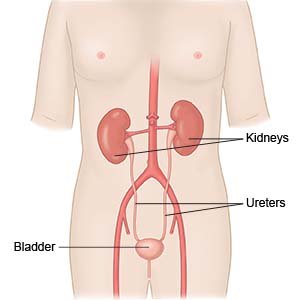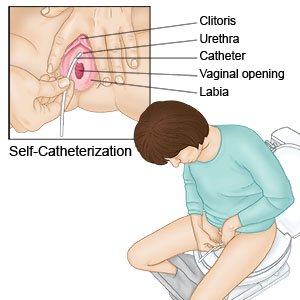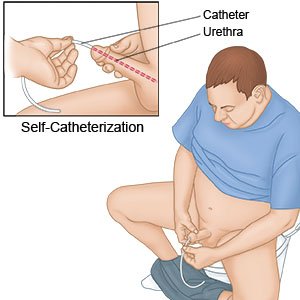Neurogenic Bladder
Medically reviewed by Drugs.com. Last updated on Aug 4, 2025.
Neurogenic bladder is a condition that causes loss of bladder function. It is usually caused by disease or by damage to your nervous system. Neurogenic bladder may cause urinary incontinence (trouble controlling urination) or urinary retention (trouble urinating).
 |
DISCHARGE INSTRUCTIONS:
Return to the emergency department if:
- You cannot urinate.
- You see blood or clots in your urine.
- You have severe back or abdominal pain that does not go away with treatment.
Call your doctor if:
- You have a fever and chills.
- You have nausea or are vomiting.
- You feel burning when you urinate.
- You have pain in your abdomen or lower back.
- You have bladder spasms.
- You are urinating less than usual for you.
- You have questions or concerns about your condition or care.
Related medications
Treatment options
The following list of medications are related to or used in the treatment of this condition.
Medicines:
- Medicines can help control your bladder. You may also be given antibiotics to prevent or treat a bacterial infection.
- Take your medicine as directed. Contact your healthcare provider if you think your medicine is not helping or if you have side effects. Tell your provider if you are allergic to any medicine. Keep a list of the medicines, vitamins, and herbs you take. Include the amounts, and when and why you take them. Bring the list or the pill bottles to follow-up visits. Carry your medicine list with you in case of an emergency.
Manage your symptoms:
- Train your bladder. Go to the bathroom at set times, such as every 2 hours, even if you do not feel the urge to go. You can also try to hold your urine when you feel the urge to go. For example, hold your urine for 5 minutes when you feel the urge to go. As that becomes easier, hold your urine for 10 minutes.
- Empty your bladder with a catheter. Healthcare providers will teach you how to safely use a catheter at home.


- Keep a urinary incontinence (UI) record. Write down how often you leak urine and how much you leak. Make a note of what you were doing when you leaked urine. Bring the record to your follow-up appointments.
- Drink liquids as directed. Ask how much liquid to drink each day and which liquids are best for you. Limit caffeine. Caffeine may irritate your bladder.
Follow up with your doctor as directed:
Write down your questions so you remember to ask them during your visits.
© Copyright Merative 2025 Information is for End User's use only and may not be sold, redistributed or otherwise used for commercial purposes.
The above information is an educational aid only. It is not intended as medical advice for individual conditions or treatments. Talk to your doctor, nurse or pharmacist before following any medical regimen to see if it is safe and effective for you.
Learn more about Neurogenic Bladder
Treatment options
Care guides
Further information
Always consult your healthcare provider to ensure the information displayed on this page applies to your personal circumstances.
